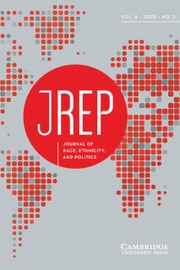Article contents
The Persistence of Racialized Health Care Attitudes: Racial Attitudes among White Adults and Identity Importance among Black Adults
Published online by Cambridge University Press: 09 August 2019
Abstract
This study evaluates the emergence and persistence of the racial divide on health reform in public opinion using survey data from 2008 through 2017. The findings support existing work showing a consistent relationship between racial resentment and attitudes on the Affordable Care Act among White adults. However, the study also builds on existing work by evaluating the relationship between strength of racial identity among Black adults and health care opinion during President Barack Obama's Administration. The paper investigates the implications of the findings for future health policy in the post-Obama era using survey data on the Republicans’ attempt to pass the American Health Care Act in 2017. The results underscore the conditions that make the “spillover” of racial attitudes into seemingly non-racial policy areas more or less likely to occur. The findings also provide suggestive evidence for how future health reforms may receive different levels of support from both White and Black adults.
- Type
- Research Article
- Information
- Copyright
- Copyright © The Race, Ethnicity, and Politics Section of the American Political Science Association 2019
Footnotes
Thank you to LaFleur Stephens-Dougan, Seth Goldman, and the editors and anonymous reviewers at the Journal of Race, Ethnicity, and Politics for their helpful feedback.
References
REFERENCES
- 9
- Cited by




